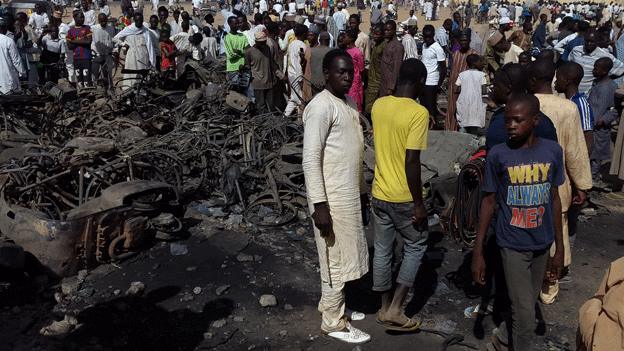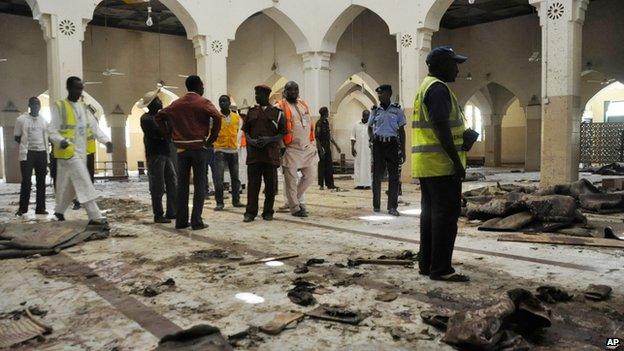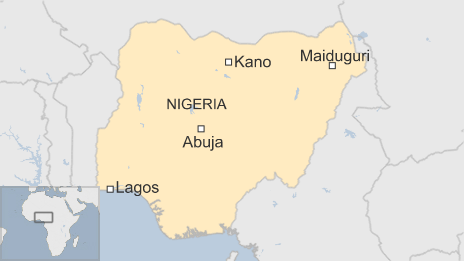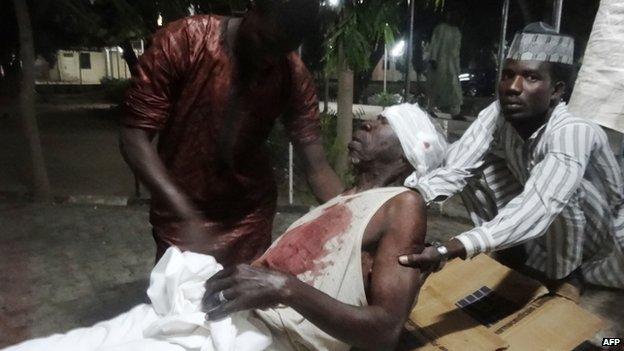Boko Haram Kano attack: Loss of life on staggering scale
- Published
Will Ross reports from Kano
The tension is palpable in Kano, after bombers and gunmen struck killing more than 100 people at the central mosque.
No-one here is in any doubt that Boko Haram did it.
It seems people do not know where to vent their anger now but hostility hangs in the air.
Inside the mosque, the sight is shocking.
Beyond the blood-soaked steps, the floor is strewn with debris: scattered prayer mats, beads, smashed spectacles and pages from the Koran.
There are bullet marks on the pillars and the suicide bombers' blood can be seen splattered across the walls and right up inside the dome.
"We heard a loud sound outside, but people said let's continue praying," said Adamu Magashi, who was inside facing the imam who had just finished his sermon at the time of the attack.

The people of Kano have been shocked and traumatised before by bombers and gunmen working in tandem

Blood and debris are everywhere inside the mosque
"Then a bomb went off right inside the mosque and somebody started shooting. We tried to move towards the imam and there was another blast - we couldn't even see each other as we tried to escape," he told me after returning to the scene.
Attackers beaten
Outside, a large crowd stands over the twisted remains of the motorbikes and bicycles that were engulfed in the flames when the first bomber struck, driving a car into the assembled worshippers.
Policemen occasionally disperse the agitated throng.
Another crowd stares at a collection of blackened shoes that has been gathered up in the large open sandy area in front of the green domed mosque.
"This was the first time ever the five daily prayers were not observed in this mosque," one shocked man, who has often prayed here, told me, describing the attack as unimaginable.
On Friday, the terror swiftly turned to fury when three of the gunmen were overpowered right outside the mosque. They were beaten and burnt to death.
Had their lives been spared, they could have provided useful intelligence on the group behind the violence - not that the police have a good record of investigating and prosecuting. Boko Haram's former leader Mohammed Yusuf was killed when in police custody in 2009.
At one of the hospitals, where the hundreds of injured are being treated, the police had to intervene to stop a mob lynching a man who had somehow caused fury by taking a photograph.
Shockwaves
By targeting such a prominent place of worship, the jihadists have sent shockwaves right across Nigeria.
This was not just another attack - Boko Haram seemed to be stating it had no respect for the way Islam is practised here.

The people of Kano have been shocked and traumatised before by bombers and gunmen working in tandem.
This was by no means the first Boko Haram attack on a mosque.
But it was possibly the most devastating.
And whilst some have portrayed the Boko Haram insurgency as a war on Christianity, this attack is yet another stark reminder that the vast majority of victims in the conflict have been Muslims.
Back in April 2007, a high-profile Muslim cleric was killed in Kano. Sheikh Ja'afar Mahmoud Adam, was gunned down as he prayed at a mosque here after criticising the group's hardline ideology.
Seven years on and the list of targets has grown to include policemen, soldiers, government workers, schoolchildren, teachers, vigilantes, entire barracks as well as towns and villages that have recently been captured by the Islamist insurgents.
Anyone who does not subscribe to Boko Haram's own interpretation of Islam is a potential victim.
Defiant emir
The mosque is situated right next to the emir of Kano's palace and is where the outspoken Mohammed Sanusi II regularly preaches.
Some people suggest it is no coincidence that the jihadists chose this mosque.

Hundreds of people were also injured in the attack on Kano
Just last week, in the very same building, the emir warned people not to rely on protection by the military, urging them to defend themselves against attacks by the insurgents.
"If people flee the villages, the terrorists slaughter our male children and abduct our girls to force them in to slavery," he said.
He was out of the country when the gunmen and bombers struck, but he returned on Saturday, visited the mosque twice and sounded defiant.
"We will never be intimidated into abandoning our religion, which is the intention of the attackers," he said. He later lead evening prayers at the bloody scene.
As trucks take away the debris, people are now cleaning up the mosque ready to pray again.
But the jihadist attacks are so relentless that no-one knows where they will strike next.
In the 10 days prior to the Kano attack, 188 people were killed by Boko Haram in four separate attacks. And those are just the incidents we heard about.
The loss of life here is on a staggering scale, but the politicians hardly mention it. There's a presidential vote in February, and election fever takes precedence.